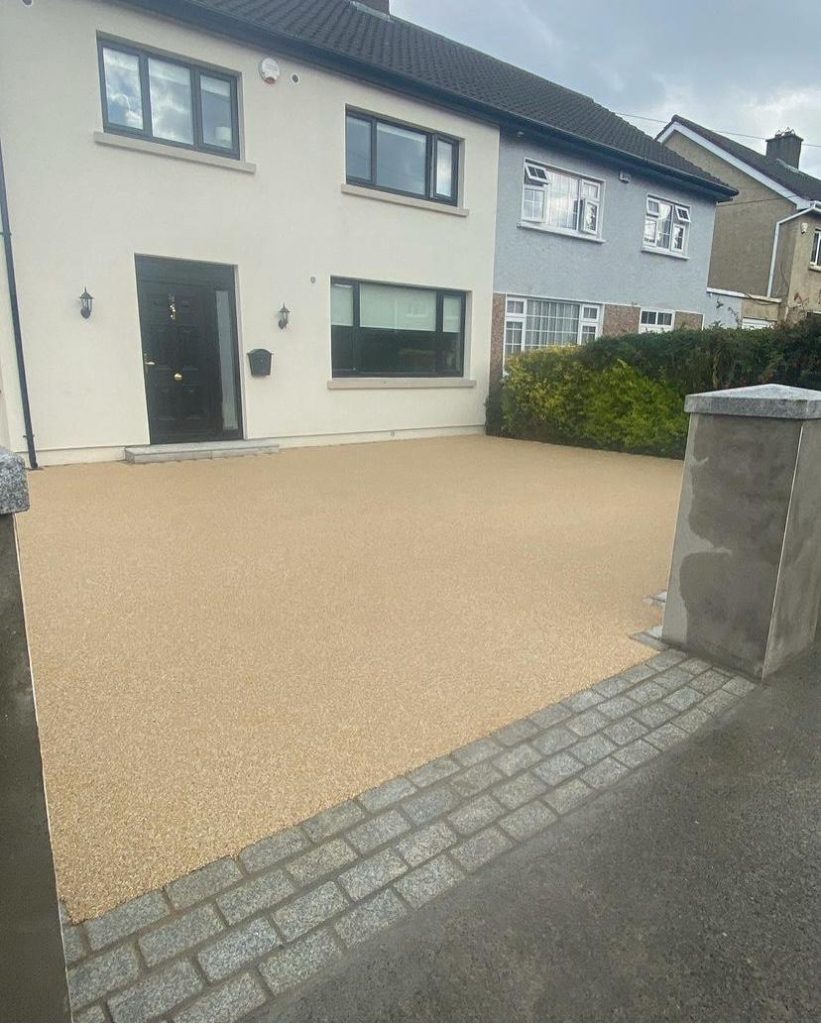Get a Free Quote
Contact us for a free, no obligation quote for your new garden or driveway. We won’t be beaten for price, quality or service.
Resin-bound Driveways have gained popularity throughout Ireland due to their versatility, aesthetics, and functional properties. They are used both in residential and commercial applications as an alternative to traditional paving options. In this post, we will discuss everything that you need to know about Resin Paving.

A resin-bound surface refers to a type of paving or flooring system that involves mixing natural aggregates (such as gravel, stones, or quartz) with a clear resin binder. The mixture is then spread or poured onto a prepared surface, creating a seamless and durable finish.
The process involves thoroughly coating the aggregates with the resin binder before laying them on the desired area. This creates a strong bond that holds the individual stones together, resulting in a solid, permeable surface. The resin-bound surface is often used for driveways, walkways, patios, and other outdoor areas.
Installing a resin-bound driveway involves several steps to ensure a durable and attractive finish. Here is a general overview of the process we follow at Greystones Paving Contractors:
Resin-bound driveways have gained popularity for several reasons, including their aesthetic appeal, durability, permeability, and ease of maintenance. Here are some key factors contributing to the popularity of resin-bound driveways:
Overall, the combination of aesthetic appeal, durability, permeability, and ease of maintenance makes resin-bound driveways an attractive option for many homeowners seeking a functional and visually appealing outdoor surface.
Aesthetics:
It’s important for homeowners to carefully weigh these pros and cons based on their specific needs and preferences before choosing a resin bound driveway. Consulting with a professional installer such as Greystones Paving can provide valuable insights and guidance.
The cost of artificial grass can vary depending on several factors, including the quality of the product, the size of the area to be covered, and the complexity of the installation/groundwork. Here are some cost considerations when it comes to installing an artificial lawn:
Material cost: Artificial grass is typically priced per square foot or square meter. The cost per square unit depends on the quality, brand, and specifications of the turf. Higher-quality products generally will to be more expensive.
Installation cost: The cost of installing an artificial lawn involves several factors, such as ground preparation, labor, and additional materials like base materials, adhesives, and infill. Installation costs can vary significantly depending on the complexity of the project and any specific requirements.
Additional costs: Depending on the project, there may be additional costs to consider. This can include removing existing vegetation, soil excavation, drainage system installation, edging materials, or any customization requests.
Here at Greystones Paving we are happy to provide a free consultation & personal quote for your artificial lawn installation. We will be delighted to answer any questions that you might have beforehand to help you make a decision what you want for your perfect garden.
Resin Bound Driveways are a fantastic option for Irish homes. They feel great underfoot and are durable for motor vehicles to park. As well as that, resin bound surfaces are permeable which means that any rain water will seep through and not leave puddles
Yes, resin bound surfaces are suitable for many different areas such as walkways, driveways, and patios. Because they are permeable, durable and feel great underfoot, they can even be used in commercial spaces such as bars, cafes and restaurants.
During installation of a resin bound driveway, you will not be able to park cars on it. You will however continue to have access the house and our experienced team will do everything possible to minimise interference for you. We will also clean everything as we go to ensure safe access to your home.
Determining a precise cost per square meter for resin driveways proves challenging due to the unique considerations and specifications inherent to each project. In a general sense, however, project expenses typically start at around 80 euros per square meter and increase based on factors like the area's size, existing subbase, and the type of aggregate selected. This cost specifically covers the supply and installation of the resin and chip (aggregate stone mix), excluding additional elements such as the subbase (tarmac or concrete), drainage, and edging/kerbing, which are considered extra expenses.
The ultimate cost of a resin-bound driveway hinges on various factors, including the following questions:
For an UV stable resin overlay applied at 18mm, approximate costs per square meter are as follows:
The time it takes to install a resin-bound driveway can vary depending on several factors, including the size of the area, the complexity of the project, and environmental conditions. Here is a general timeline for the installation of a resin-bound driveway:
The total time for a resin-bound driveway installation can range from several days to a couple of weeks, depending on the size of the project and any specific requirements. It's important to follow the manufacturer's guidelines for curing times and other recommendations to ensure the longevity and performance of the resin-bound surface. Additionally, weather conditions can influence the installation timeline, as extreme temperatures or wet weather may affect the curing process.
Contact us for a free, no obligation quote for your new garden or driveway. We won’t be beaten for price, quality or service.